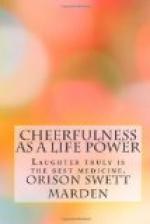“My body must walk the earth,” said an ancient poet, “but I can put wings on my soul, and plumes to my hardest thought.” The splendors and symphonies and the ecstacies of a higher world are with us now in the rudimentary organs of eye and ear and heart. Much we have to do, much we have to love, much we have to hope for; and our “joy is the grace we say to God.” “When I think upon God,” said Haydn to Carpani, “my heart is so full of joy that the notes leap from my pen.”
Says Gibbons:—
“Our
lives are songs:
God writes the
words,
And we set them to music at
leisure;
And the song is
sad, or the song is glad,
As we choose to fashion the
measure.
“We
must write the song
Whatever the words,
Whatever its rhyme or meter;
And if it is sad,
we must make it glad,
And if sweet, we must make
it sweeter.”
VI. “LOOKING PLEASANT”—SOMETHING TO BE WORKED FROM THE INSIDE.
Acting on a sudden impulse, an elderly woman, the widow of a soldier who had been killed in the Civil War, went into a photographer’s to have her picture taken. She was seated before the camera wearing the same stern, hard, forbidding look that had made her an object of fear to the children living in the neighborhood, when the photographer, thrusting his head out from the black cloth, said suddenly, “Brighten the eyes a little.”
She tried, but the dull and heavy look still lingered.
“Look a little pleasanter,” said the photographer, in an unimpassioned but confident and commanding voice.
“See here,” the woman retorted sharply, “if you think that an old woman who is dull can look bright, that one who feels cross can become pleasant every time she is told to, you don’t know anything about human nature. It takes something from the outside to brighten the eye and illuminate the face.”
“Oh, no, it doesn’t! It’s something to be worked from the inside. Try it again,” said the photographer good-naturedly.
Something in his manner inspired faith, and she tried again, this time with better success.
“That’s good! That’s fine! You look twenty years younger,” exclaimed the artist, as he caught the transient glow that illuminated the faded face.
She went home with a queer feeling in her heart. It was the first compliment she had received since her husband had passed away, and it left a pleasant memory behind. When she reached her little cottage, she looked long in the glass and said, “There may be something in it. But I’ll wait and see the picture.”
When the picture came, it was like a resurrection. The face seemed alive with the lost fires of youth. She gazed long and earnestly, then said in a clear, firm voice, “If I could do it once, I can do it again.”
Approaching the little mirror above her bureau, she said, “Brighten up, Catherine,” and the old light flashed up once more.




